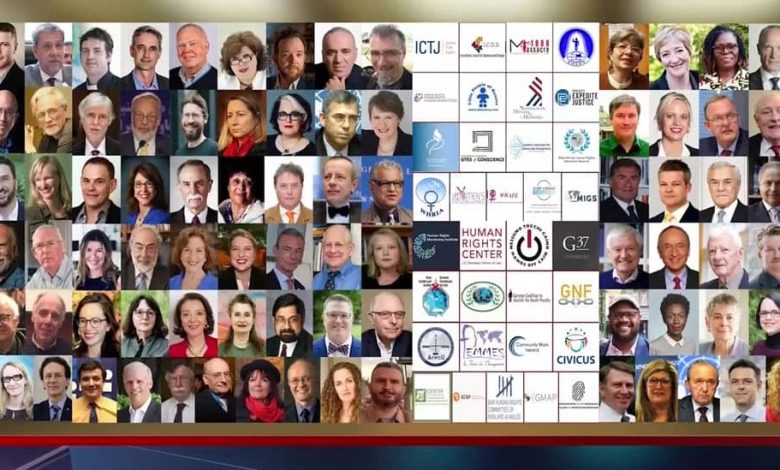Iran: Open Letter with an Impact

Written by
Aladdin Touran
“Since popular protests began in Iran following the death in custody of Mahsa Amini, the authorities have murdered as many as 750 protesters, including dozens of children, on the streets or in prison. As many as 30,000 protesters have been arrested, with dozens receiving the death sentence for ‘moharebeh’ (waging war on God) in fast-track sham trials without the right to due process.”
The quotation is part of an open letter to Western leaders by 238 current and former UN officials, judges, human rights experts, Nobel laureates, and non-governmental organizations. They asked for pressure on Iran to stop the execution of anti-government protesters, including by sanctioning officials. They recommend expelling Iranian ambassadors and blacklisting the Islamic Revolutionary Guard Corps (IRGC).
The open letter was sent to the leaders of Canada, the European Union, the United Kingdom, and the United States last week after Iranian authorities executed two people, one of them in public, for taking part in ongoing widespread protests.
Open letters usually have a symbolic and less effective impact. The pages of various newspapers worldwide have seen similar cases, often signed by intellectuals, during the three months that have passed since the uprising of the Iranian people. But this letter has an effect beyond a symbolic act:
Part of the signatories is former United Nations officials and reputable human rights organizations. A former UN Human Rights Council President, three former UN Assistant Secretaries-General, 17 former UN human rights rapporteurs, 15 Nobel laureates, and prominent human rights figures such as Garry Kasparov, former world chess champion, and Rowan Williams, former Archbishop of Canterbury. Former United States Ambassador for Global Criminal Justice, former American Ambassador for Religious Freedom, former French Ambassador for Human Rights, six former ambassadors to the United Nations in Geneva, and two former Special Advisers to the United Nations Secretary-General on the Responsibility to Protect (R2P) is among the signatories. Human rights are no longer the exclusive domain of a country’s authorities, but a matter related to organizations with global influence. No one can violate these rights without justification and maintain a minimum of international legitimacy.
Another part of the signatories is judicial officials who have represented international courts and enforced their rulings. A former International Criminal Court (ICC) president, a former President of the Court of First Instance of the European Communities and five former judges of the General Court of the European Union, the former Chief Prosecutor of the United Nations International Criminal Tribunals for former Yugoslavia and Rwanda, the lead prosecutor in Slobodan Milosevic’s trial in the Hague, the United Nations’ former chief prosecutor in the Special Court for Sierra Leone are among the signatories. As such, the letter sounds like a warning, a reminder of the fate that awaits human rights violators and perpetrators of crimes against humanity and defenseless people.
To: @POTUS @eucopresident @RishiSunak @JustinTrudeau
JVMI and 238 NGOs, current and former UN officials, human rights experts and Nobel laureates appeal to you today
Act Now To Stop Iran From Executing Protesters
Full text of open letter: https://t.co/oIGgntJw1U #IranProtests pic.twitter.com/uLzfQLsuzO
— JVMI (@jvmifoundation) December 21, 2022
The signatories emphasize that what increases their concern is the decades-long record of the Iranian regime in mass executions, specifically “as many as 30,000 political prisoners, mostly MEK members, extra-legally executed or forcibly disappeared during the 1988 massacre.” The precise meaning is that the violation of human rights in Iran has a history long as the life of this regime, and the immunity under which the mullahs have ruled by using all crimes is no longer acceptable. Moreover, the letter states: “decades of apparent silence and inaction by the international community have helped fuel a culture of impunity in Iran. Since the 1980s, the authorities in Iran have extra-judicially executed tens of thousands of dissident protesters and political prisoners, some as young as 13.”
“Today, as brave young Iranians continue their defiant protests to end decades of tyranny, it is imperative that the world’s leading democratic nations act urgently to prevent the Iranian authorities in their attempts to quell the ongoing protests through the use of the death penalty in contravention of international law.”
The request of the signatories is explicit enough: “We urge you to hold the leadership of the Islamic Republic of Iran to account for committing crimes against humanity, for acts including the killing of children and the public hanging of protesters, and to use all internationally available means to bring them to justice.”
“We propose that your nations set up a joint mechanism to rapidly identify and impose joint sanctions against the individual masterminds and perpetrators of the ongoing crackdown on the protesters.”
“Finally, we request that, where applicable, your nations downgrade diplomatic ties with the Islamic Republic of Iran, including by withdrawing your ambassadors and likewise expelling the representatives of what is in fact a murderous government.”

